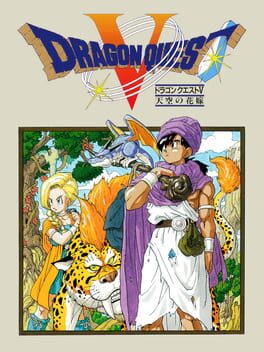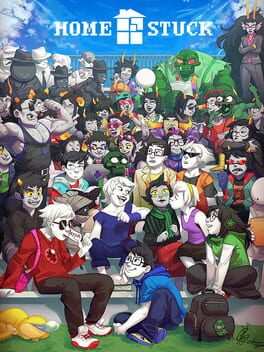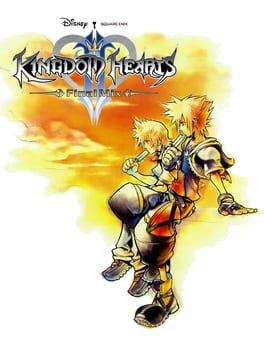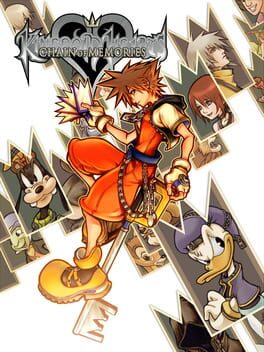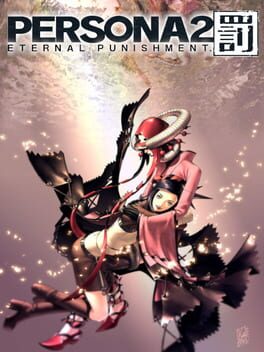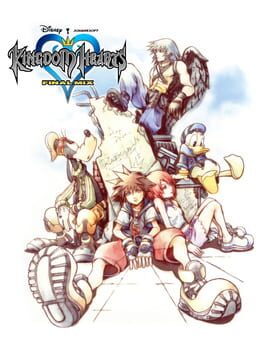dalt
BACKER
Bio
nyaa
i have only logged games ive played since the creation of this profile
i like cool and good video games and especially love games that play around w ludonarrative stuff
jrpgs are probably my favorite genre if that is not obvious by my favs
i am usually more willing to give a game slack for attempting something novel than i am to give it props for doing something standard very well
nyaa
i have only logged games ive played since the creation of this profile
i like cool and good video games and especially love games that play around w ludonarrative stuff
jrpgs are probably my favorite genre if that is not obvious by my favs
i am usually more willing to give a game slack for attempting something novel than i am to give it props for doing something standard very well
Badges

Pinged
Mentioned by another user

Well Written
Gained 10+ likes on a single review

Loved
Gained 100+ total review likes

Popular
Gained 15+ followers

Gone Gold
Received 5+ likes on a review while featured on the front page

Liked
Gained 10+ total review likes

1 Years of Service
Being part of the Backloggd community for 1 year

Best Friends
Become mutual friends with at least 3 others

Noticed
Gained 3+ followers
Favorite Games
075
Total Games Played
024
Played in 2024
109
Games Backloggd
Recently Played See More
Recently Reviewed See More
chain of memories is a really interesting game conceptually; it was made as a fairly direct gap-filler to lead into KH2, but it also was in response to demand for a portable version of kh1, and it wanted to make a good explanation in-universe for why progression gets reset from KH1 to KH2. ignoring the fact that the last bit is a very funny reason to make an entire game, this mish-mash of goals creates a very odd playing experience. i felt that the focus in the story on jumbled and distorted memories created a fairly strong justification for the repeated worlds and bosses from KH1, while still recontextualizing those moments in a more interesting way. the semi-randomized dungeon crawler elements are also a really cool way to represent the fickle nature of memory through gameplay, and it's very fun to get limited customization of the room layouts depending on the situation. unfortunately, the focus on memories also extends to the combat system, which is very messy and definitely needed a lot of tuning. contrary to what many people say, i don't actually think splitting actions into cards is the problem here (reverse/rebirth proves this, imo). the bigger issue is the deckbuilding, which feels totally at odds with RPG progression and makes COM oscillate wildly between completely trivial combat and absurdly difficult combat. i tend to be a fan of experimental and "imbalanced" progression systems (the junction system in ff8 is a favorite), but COM's cards feel poorly accounted for; the game offers you relatively few guaranteed cards, and those it gives you are likely going to be pretty far from the cornerstones of your deck. this ends up meaning the boss design needs to account for too many potential playstyles, so you get lots of inflated health bars and lots of bosses that are designed around playing defensively and waiting until they have no chance to counterattack. i think it's actually very charming and cool that many of the bosses play by the same ruleset the player does, but because COM has no idea what cards you have, the only real surefire strategy against many bosses is waiting for them to waste their cards on sleights and catching them reloading over and over. if the progression was not as reliant on lucky pulls from packs, these bosses would be able to have more reliable and interesting counterplay, but unfortunately the systems here just don't allow for that. these incredibly boring and drawn out encounters are most noticeable with the final boss of the main game, where the most reliable strategy i could find was just to parry every attack he throws out with a 0 card, then use the cloud summon to chip at him a few times, repeat repeat repeat. this took about 10 minutes, and might be the most boring boss fight i've ever played.
reverse/rebirth fixes basically all of the issues i mentioned above by just giving you set decks for each floor, which makes most of the fights far more interesting. wayyy faster and less reliant on cheese, i love the emphasis on card dueling.
the story in COM is actually really great by the way. i could personally tell it was written after KH2, but it's still a pretty interesting story that explores the inner psychology of both the protagonists a little bit. there's a lot of cool hints at future games (i think, at least) and the addition of organization 13 is just great. i had found the overemphasis on disney elements in the story of kh1 to be a bit frustrating, so COM's story was a great change of pace.
reverse/rebirth fixes basically all of the issues i mentioned above by just giving you set decks for each floor, which makes most of the fights far more interesting. wayyy faster and less reliant on cheese, i love the emphasis on card dueling.
the story in COM is actually really great by the way. i could personally tell it was written after KH2, but it's still a pretty interesting story that explores the inner psychology of both the protagonists a little bit. there's a lot of cool hints at future games (i think, at least) and the addition of organization 13 is just great. i had found the overemphasis on disney elements in the story of kh1 to be a bit frustrating, so COM's story was a great change of pace.
the internet was a paradigm shift, wasn't it? since the late 90s we've seen an increasing amount of discussion around fact and fiction becoming muddied, with the distinction seemingly being irrelevant to many. information is as free as it gets, but the direct consequences for misinformation are minimal. of course, there's no end of works focusing on the subject of truth in the information age; in this very medium you have one of the most prescient and unique statements on the matter with MGS2. the persona 2 duology, however, is unique in that a lot of what it has to say feels before it's time. this is certainly an internet-age set of games, but calling them cyberpunk in any way would be a misnomer. persona 2 really is concerned about the broader societal implications that come about from people being willing and able to believe almost anything, and it directs that focus towards the physical world. in a lot of ways, P2 feels responsive towards the increasing prevalence of conspiracy theories in pop culture (a lot of popular conspiracies are even used as inspiration for plot beats in innocent sin), and i think P2 takes a unique stance in that they don't flat out deny that these things are worth believing in or looking into. rumors come to life, but rumors do have to start from somewhere; there's shreds of truth in any lie.
P2, and especially EP, puts a ton of emphasis on allowing the city to feel lived-in and breathing. for anything you do, there's new dialogue everywhere, and the main progression gimmick (rumors coming to life at the player's will) is utilized in a lot of clever ways to achieve that goal. persona games are known for being text-heavy in general, but i wouldn't be surprised if these two games had some of the larger scripts in the franchise, because every story moment basically changes the whole city. in a game all about listening to the pulse of the city, this feels very appropriate, creating a much stronger sense of immersion than you'd expect for a game like this.
now for stuff focused solely on EP:
out of all of the traditional storytelling archetypes, probably the most common for a JRPG to use is the coming of age story. this makes a lot of sense, logistically; most video game consumers are teenaged, most JRPG protagonists are teenaged, and the power fantasy typically inherent to the genre is about starting from a weak position and growing to be strong. eternal punishment doesn't have these sorts of goals, and it's a lot more engaging for it. EP's cast is a group of adults, and you'd be forgiven for thinking at the beginning of the game that this cast doesn't have much room to grow. indeed, EP's characters definitely do not "grow up" in the way typical for JRPG writing; these characters start out pretty divided and uncomfortable with each other, but there isn't a big climax where they confront their fears all at once and become a team. instead, EP uses optional dialogue to subtly paint a portrait of each of it's cast members and has them slowly begin to open up over time. it's rewarding and immersive to have these characters actually gain new contacts due to these little nuggets of development, and it's a much more lifelike approach to party development than you see in more traditional narratives. a key concept this game has about identity is that it's self-determined; people aren't simply on a search to discover how they really are, but are ever-changing and create the path they walk. i think integrating this into the story by making much of the development up to the player is exceptionally clever. it's a fairly common statement among writers attempting subversive character writing to say that human beings don't have arcs. i feel that this is often used to justify uninteresting or directionless character writing, but in EP it feels like a pretty considered thesis for the game's writing. i guess a better way of saying it is that people don't just have arcs, they don't grow up at one specific point. development here is more like a stream, ebbing and flowing.
STORY SPOILERS HERE
all that being said, eternal punishment was greenlit for a very specific reason; to give an alternate perspective to tatsuya. i also felt that this was done quite well. tatsuya was about as well-characterized as a silent protagonist could get in IS, i felt, but getting a voice definitely helps him. his self-imposed suicide mission is a great narrative hook, and the reasoning behind his existential guilt is one of the best reveals of the story. tatsuya commits (yet another) innocent sin by refusing to forget his friends again, and it's not surprising that he'd try to shoulder the burden to protect their reality. tatsuya is ultimately a character whose greatest weakness is his protective instinct, but through the comfort of the main cast he's able to get past that and use his sins as blessings. it's beautiful payoff for a story that's rife with personal loss and seemingly hopeless odds.
in a lot of ways, P2 reminds me of panzer dragoon saga. both are these hugely ambitious games from around the same time that are driven by the urge to do something different. when i played innocent sin, i felt that that game's attempts at novelty wore thin; the character writing didn't feel dense, the combat was far too easy, and the deviations from standards felt poorly justified by the narrative. although there are still things i dislike in EP, the overall package feels more cohesive. rumors are more immersive and offer more variety, character dialogue is more interesting, the combat and character progression is more difficult but offers more interesting decisionmaking. definitely a huge improvement.
P2, and especially EP, puts a ton of emphasis on allowing the city to feel lived-in and breathing. for anything you do, there's new dialogue everywhere, and the main progression gimmick (rumors coming to life at the player's will) is utilized in a lot of clever ways to achieve that goal. persona games are known for being text-heavy in general, but i wouldn't be surprised if these two games had some of the larger scripts in the franchise, because every story moment basically changes the whole city. in a game all about listening to the pulse of the city, this feels very appropriate, creating a much stronger sense of immersion than you'd expect for a game like this.
now for stuff focused solely on EP:
out of all of the traditional storytelling archetypes, probably the most common for a JRPG to use is the coming of age story. this makes a lot of sense, logistically; most video game consumers are teenaged, most JRPG protagonists are teenaged, and the power fantasy typically inherent to the genre is about starting from a weak position and growing to be strong. eternal punishment doesn't have these sorts of goals, and it's a lot more engaging for it. EP's cast is a group of adults, and you'd be forgiven for thinking at the beginning of the game that this cast doesn't have much room to grow. indeed, EP's characters definitely do not "grow up" in the way typical for JRPG writing; these characters start out pretty divided and uncomfortable with each other, but there isn't a big climax where they confront their fears all at once and become a team. instead, EP uses optional dialogue to subtly paint a portrait of each of it's cast members and has them slowly begin to open up over time. it's rewarding and immersive to have these characters actually gain new contacts due to these little nuggets of development, and it's a much more lifelike approach to party development than you see in more traditional narratives. a key concept this game has about identity is that it's self-determined; people aren't simply on a search to discover how they really are, but are ever-changing and create the path they walk. i think integrating this into the story by making much of the development up to the player is exceptionally clever. it's a fairly common statement among writers attempting subversive character writing to say that human beings don't have arcs. i feel that this is often used to justify uninteresting or directionless character writing, but in EP it feels like a pretty considered thesis for the game's writing. i guess a better way of saying it is that people don't just have arcs, they don't grow up at one specific point. development here is more like a stream, ebbing and flowing.
STORY SPOILERS HERE
all that being said, eternal punishment was greenlit for a very specific reason; to give an alternate perspective to tatsuya. i also felt that this was done quite well. tatsuya was about as well-characterized as a silent protagonist could get in IS, i felt, but getting a voice definitely helps him. his self-imposed suicide mission is a great narrative hook, and the reasoning behind his existential guilt is one of the best reveals of the story. tatsuya commits (yet another) innocent sin by refusing to forget his friends again, and it's not surprising that he'd try to shoulder the burden to protect their reality. tatsuya is ultimately a character whose greatest weakness is his protective instinct, but through the comfort of the main cast he's able to get past that and use his sins as blessings. it's beautiful payoff for a story that's rife with personal loss and seemingly hopeless odds.
in a lot of ways, P2 reminds me of panzer dragoon saga. both are these hugely ambitious games from around the same time that are driven by the urge to do something different. when i played innocent sin, i felt that that game's attempts at novelty wore thin; the character writing didn't feel dense, the combat was far too easy, and the deviations from standards felt poorly justified by the narrative. although there are still things i dislike in EP, the overall package feels more cohesive. rumors are more immersive and offer more variety, character dialogue is more interesting, the combat and character progression is more difficult but offers more interesting decisionmaking. definitely a huge improvement.
kingdom hearts is probably the most controversial JRPG franchise of all time. it's very common to see non-fans say they can't take it seriously and it's influence ruined franchises they prefer, and it is equally common to see fans say it changed their life and brings them to tears to think about. i think i come somewhere in the middle; kingdom hearts 1 is a pretty moving and cute story for it's target demographic, but it has a lot of clear growing pains that i feel could have been better addressed. the story is probably what i'd single out as the biggest strong point of kh1, it's a very pleasant little story preaching self-belief and perseverance with a lot of fun character moments. the disney stuff, for me, doesn't exactly help but doesn't really hurt. donald and goofy are enjoyable party members that don't really feel too far off from your standard comic relief party members in final fantasy games such as rikku or cait sith. i'm not sure if i'd say the friendship of the party feels especially believable by the end, but it works for the type of story kh1is trying to get across. the original characters are all also pretty fun; i'm not much of a fan of sora, since he feels very stock shonen protagonist, but riku and kairi are both fairly interesting characters. the (unintentional?) gay subtext with sora and riku is definitely the most interesting part of the character interactions in this game, it really oozes out of almost everything riku says and makes things between him and sora a bit more complicated than it initially seems. i felt that the big weakness of kh1's story came down largely to it's focus on the disney elements. many of the worlds are very stripped down versions of movie plots, which aren't really satisfying on their own and aren't really great fanservice, imo. several of my favorite disney movies actually are in kh1, but the only one i felt really happy with the representation for was nightmare before christmas. the good part of this is that the worlds are pretty short and breezy, with very little story, so if you aren't much of a disney fan they aren't tedious or anything. the bad part of this is that the overarching plot still does involve a lot of disney elements up until the last quarter or so, so if you want more meat you're going to be waiting for a while.
where i'm more mixed on kh1 is the gameplay. i played on proud mode, because i wanted to fully engage with the combat and uh... that was a mistake! not because i had too much trouble with the combat, but because kh1 has pretty minimal depth to it's combat, and the boss design can get downright atrocious. the pot centipede, giant ursula, genie jafar, chernabog, basically all of the final bosses, dragon maleficent.. there's so many fights in this game that i wouldn't call hard necessarily but would really call cheesy or boring. for most of the larger bosses the recommended strategy from experienced players is to just mash on them with aero/ra/ga and spam heals when you can with leaf bracer. i only really struggled with a handful of fights, but i would have a lot of trouble naming fights that i struggled on where the difference maker ended up being my skill rather than missing a specific spell or not using a specific summon that trivialized it. things reach a head after the first visit to hollow bastion, because beyond that point kh1 really loves throwing bosses with inflated health bars at you, and in the worst cases, those bosses have a vulnerability window of maybe 2-3 attacks if you're playing fair with them. if that sounds obnoxious and boring, that's because it is, so the recommended strategy for most of these bosses is to make sure to get aeroga and curaga and just wail on them. the room of waves of heartless being spawned on you is also just atrocious, pure chaos with very little counterplay beyond tanking. smart, aggressive play simply does not feel well-incentivized in kh1. i'd say the real peak of the game feeling challenging in a fun way would be the mid-game before you get leaf bracer, and the last fight on the first visit to hollow bastion. that fight kicked my ass a good 4 or 5 times, but it was engaging, fast, lethal, and made me want to get better. i can only hope that future kh games follow that precedent.
asides:
the ff characters in this game, imo, often didn't really act like themselves. squall, i mean leon, especially felt mischaracterized. not a big deal because the story isn't focused on them or anything but as a big fan of 8 i found it a little sad.
music is incredible, i'd mention the heartless theme, kairi's theme, the main theme, and obviously simple and clean as highlights. yoko shimomura is a great fit here, since she's experienced in music for kid's games from the mario rpg series but also has the range for more serious and heartfelt tracks.
the animation is surprisingly very high quality and emotive for a ps2 game, it seems like they really wanted to lean into disney animation principles. genie donald and goofy are all highlights in that regard
where i'm more mixed on kh1 is the gameplay. i played on proud mode, because i wanted to fully engage with the combat and uh... that was a mistake! not because i had too much trouble with the combat, but because kh1 has pretty minimal depth to it's combat, and the boss design can get downright atrocious. the pot centipede, giant ursula, genie jafar, chernabog, basically all of the final bosses, dragon maleficent.. there's so many fights in this game that i wouldn't call hard necessarily but would really call cheesy or boring. for most of the larger bosses the recommended strategy from experienced players is to just mash on them with aero/ra/ga and spam heals when you can with leaf bracer. i only really struggled with a handful of fights, but i would have a lot of trouble naming fights that i struggled on where the difference maker ended up being my skill rather than missing a specific spell or not using a specific summon that trivialized it. things reach a head after the first visit to hollow bastion, because beyond that point kh1 really loves throwing bosses with inflated health bars at you, and in the worst cases, those bosses have a vulnerability window of maybe 2-3 attacks if you're playing fair with them. if that sounds obnoxious and boring, that's because it is, so the recommended strategy for most of these bosses is to make sure to get aeroga and curaga and just wail on them. the room of waves of heartless being spawned on you is also just atrocious, pure chaos with very little counterplay beyond tanking. smart, aggressive play simply does not feel well-incentivized in kh1. i'd say the real peak of the game feeling challenging in a fun way would be the mid-game before you get leaf bracer, and the last fight on the first visit to hollow bastion. that fight kicked my ass a good 4 or 5 times, but it was engaging, fast, lethal, and made me want to get better. i can only hope that future kh games follow that precedent.
asides:
the ff characters in this game, imo, often didn't really act like themselves. squall, i mean leon, especially felt mischaracterized. not a big deal because the story isn't focused on them or anything but as a big fan of 8 i found it a little sad.
music is incredible, i'd mention the heartless theme, kairi's theme, the main theme, and obviously simple and clean as highlights. yoko shimomura is a great fit here, since she's experienced in music for kid's games from the mario rpg series but also has the range for more serious and heartfelt tracks.
the animation is surprisingly very high quality and emotive for a ps2 game, it seems like they really wanted to lean into disney animation principles. genie donald and goofy are all highlights in that regard



